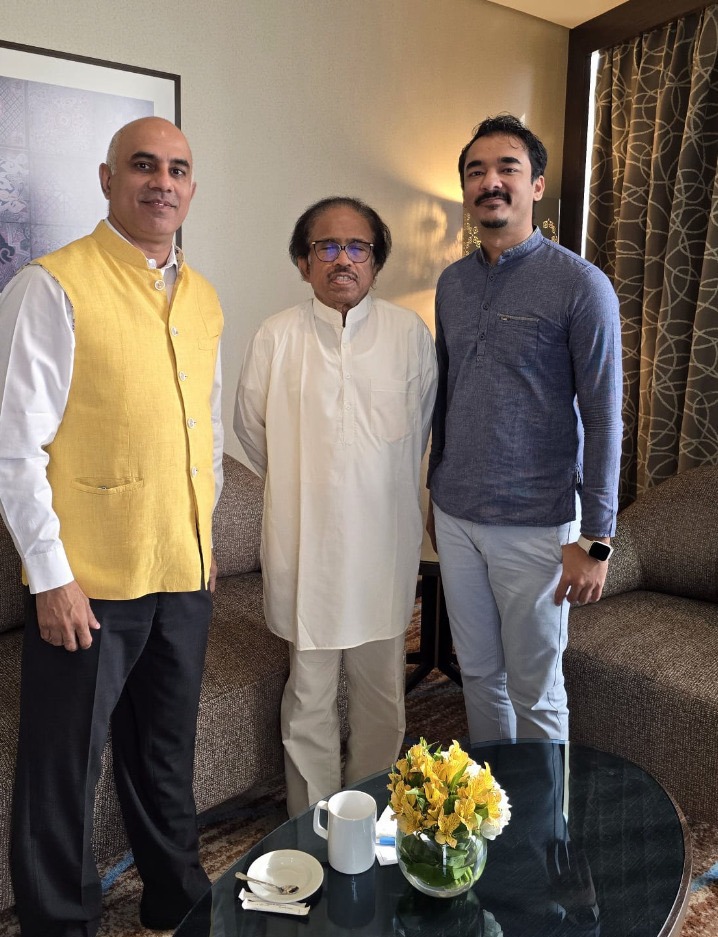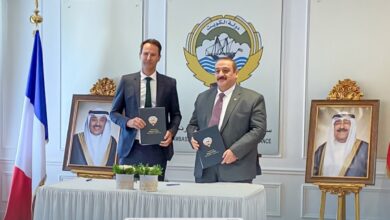Bringing people together with the universal language of music
A journey of musical excellence - Dr. L. Subramaniam

By Reaven D’Souza
Executive Managing Editor
Dr. L. Subramaniam, affectionately known as ‘Mani’, is a name synonymous with musical brilliance and innovation. Born into a musically talented family, his father, Professor V. Lakshminarayana, was a renowned Carnatic violinist, and his mother, Seethalakshmi, was a gifted vocalist and veena player
With such a musical lineage, Subramaniam was destined for greatness from a young age, and he did not disappoint. Under his father’s tutelage, Subramaniam began learning the violin at the tender age of five. By the age of six, he was already performing on stage, showcasing his prodigious talent.
In a wide ranging exclusive interview with The Times Kuwait during his brief visit to Kuwait for a first of its kind Indian musical concert at the Jaber Al Ahmad Cultural Centre, the soft spoken Dr. Subramaniam spoke about his journey of musical excellence.
“My father was responsible for putting me on the global platform,” he said, as he explained his father’s insistence of getting all his three sons to play the violin, and his vision of transforming the violin from being a mere complement instrument to a solo one. “That really opened the door for a lot of violinists to go solo,” said Subramaniam.

His early musical successes did not prevent Subramaniam from pursuing a degree in medicine at the prestigious Madras Medical College, and earning his MBBS. He credits his mother for insisting on him completing his MBBS.
However, his passion for music eventually led him to focus full-time on music and to earn a masters degree in Western classical music from the California Institute of the Arts. Subramaniam’s musical journey is marked by his ability to blend different genres and he has collaborated with renowned artists such as Yehudi Menuhin, Stéphane Grappelli, Ruggiero Ricci, and Jean-Pierre Rampal. His work spans Indian classical music, jazz fusion, Indo-jazz, World fusion, and Western classical music.
“The most crucial aspect in a live performance is understanding the music and strengths of the artists involved. These exceptional talents have honed their craft over many years to achieve and maintain their greatness, which is no small feat.
“When embarking on a project, I delve into their musical boundaries and past accomplishments. I strive to compose pieces that challenge them while staying true to their style. In music, it is essential to grasp the language, notation, and harmony, along with having a deep understanding of Indian classical music, to effectively collaborate and inspire artists to surpass their previous works. I pioneered the concept of global music, amalgamating diverse influences to create something novel and inspiring,” Subramaniam explained.
Having released over 250 recordings, including solo albums and collaborations with various artists. He has composed works for orchestras, ballets, and Hollywood film scores. His compositions often combine Western scales with micro-intervals, creating a unique fusion sound.
In 1983, he composed a double concerto for violin and flute, which was a blend of Western and Carnatic music. His album ‘Global Fusion’ (1999) brought him widespread critical acclaim and popularity, while his contributions to music have earned him numerous accolades and honors. He continues to inspire musicians and audiences alike with his innovative approach to music and his dedication to cultural exchange through music.
When queried on how he balances the structure of his raga known for their virtuosity and improvises to create spontaneous musical ideas during a performance, Dr. Subramaniam explains that he never plays notes mechanically but infuses each note with its own life, emotion and color This depth, he says, transforms the music, resonating with both the performer and the audience. He adds that while technical mastery is vital for unrestricted expression, it is the infusion of emotion that leaves a lasting impact on audiences.
“I recall instances at large festivals where, amidst energetic performances, I would transition into a soulful solo, captivating listeners despite adverse weather conditions. It is the emotional connection that transcends barriers, making virtuosity coupled with musicianship truly impactful,” he quips
As the founder and director of the Lakshminarayana Global Music Festival (LGMF), an annual event that celebrates music from around the world, he has ensured that his contributions to music and future generations will be everlasting.
“Previously, pursuing a career in music wasn’t widely seen as a viable option, with professions like medicine, engineering, and chartered accountancy being the norm. However, through establishing myself as a successful soloist and performing at prestigious venues worldwide, we’ve demonstrated that being a musician is a legitimate path. Today, many young musicians are embracing this profession, not only in classical music but also in fusion bands like Global Fusion, which I initiated in the early 70s,” he explains.
He also points out that to bridge the gap between traditional education and musical excellence, he established the Lakshminarayana Global Centre of Excellence, offering degrees ranging from BA to PhD.
”Our curriculum prioritizes practical training under experienced gurus rather than relying solely on textbooks. Collaborating with universities such as Jain University (Bangalore, Karnataka) and Vishwakarma University (Pune, Maharashtra), we offer UGC-approved degrees and certificates, providing a multidisciplinary education covering Carnatic, Hindustani, and global music.” he says
“Through our efforts, we aim to provide aspiring musicians with the tools and knowledge needed to excel in their chosen field, whether as performers or educators. This endeavor is not just my legacy but also a continuation of my father’s vision for musical education.” says Dr. Subramaniam with a sense of pride.













